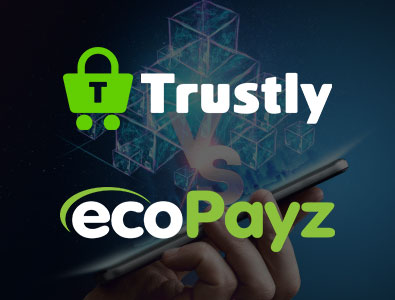On this page
Trustly vs. Payz at Online Casinos
Introduction
While the online gambling industry…
… is no longer in its early days, it doesn’t appear to be showing any signs of slowing down. Brands and services involved in online gambling mechanisms as a whole are just as actively striving to achieve better features and performance capacities for each of their products, in an attempt to surpass the ever-lasting competition.
Naturally, just like in any other industry, some pioneering brands and companies are known to hold key positions even as the market continues to progress. Nevertheless, this still leaves plenty of room for newcomers and late bloomers which are expected to contribute to the overall diversity of services.
One of the key services…
… in terms of the online gambling industry is payment processing. After all, profits, and real money gambling in general, would be practically impossible if it weren’t for a safe, reliable and accessible way to transfer funds from one point to another. And considering the global extent of some leading operators’ services, these points could be well apart in some cases.
Consequently, the older and more traditional payment methods, such as Visa or Maestro credit, debit cards and paper checks, were joined by more contemporary online payment processors, e-wallets. Even though PayPal is considered to be the global pioneer in this line of work, plenty of other companies followed in its footsteps soon enough.
Some, like Payz…
… have adopted the e-wallet model and only built upon it with additional services in functionalities. Others, however, would go on to use the basic principles of money transfer, security and convenience, while modifying the service for a new customer experience. Such was the case with Trustly, one of the leading contenders in the e-wallet industry.
About Trustly
The Trustly Group AB…
… is responsible for the launch and operations of the namesake product, initially appearing on the online payments market back in 2008. In fact, it is interesting to note that the service was simply the brain child of three tech-savvy friends who got together in Stockholm, Sweden, and gave rise to a whole new brand in online banking.
Trustly’s progress…
… has been remarkable from start to present time, and most evident with its extensive expansion. After all, with offices in London, Malta and Barcelona, among other locations worldwide, there is bound to be just as much traffic flowing through its payment processing channels. And indeed, there is – so much so that the timeline on their official site actually marked the transition from 1 million transactions a year to over 2 million a month.
With such, and plenty of other impressive achievements and acknowledgments boosting the brand’s reputation, Trustly is a worthy contender to any of the remaining top-ranking online banking options – in this case, Payz.
About Payz
Since 2000…
… the brand initially known as ecoCard has been putting in a lot of effort to improve and optimize their product offering. With PSI-Pay Ltd. holding the reins as the official owner, the company slowly started adopting the industry trends of the time. The first step of the rebranding changed the company’s name to Payz – a move that made sense once the company started releasing additional specific products, including ecoAccount and more.
Nowadays…
… it is one of the top options for e-wallet enthusiasts, allowing for easy, secure and relatively convenient online payment method. E-shops and all kinds of online merchants, online casinos included, have listed it in their banking page as an available processing option for all payments and transactions.
Trustly vs. Payz
With plenty of online casino players, gamers or even e-shoppers in general, dwelling between the two options, a comparative overview of their key features is bound to come in handy. This includes the general user experience and features on offer, along with deposit and withdrawal characteristics – fees, limits, currency options, processing times and anything else that could be of use.
Concluding with some points on extras, such as benefits, loyalty program and even plastic card availability, the comparison wraps up an in-depth preview of both Trustly and Payz, allowing players and clients alike to have the final say in their choice.
User Accounts
Both options are widely and frequently available at all the top merchants, which rules out availability of the service as a more practical guideline. However, the availability of account services provided by each brand separately is a good starting point to making the right choice, especially if you have some requirements in mind.
Payment Methods Comparation
 |
 |
||
|---|---|---|---|
| Payment method name | Trustly | Payz | |
| Available accounts | 1 account | 1 account | |
| Available currencies | n/a | 45 | |
| One time signup bonus | n/a | n/a | |
| Account management fees | n/a | free | |
| Account unused | n/a | Account maintenance after inactivity of 12 months; 1.50 EUR per month | |
| Exchange fees (FX) | n/a | n/a | |
| p2p Money transfer | |||
| Send money p2p | n/a | Transfer to/from ecoPayz Merchant; Free | |
| Receive money p2p | n/a | Free | |
| Deposit fees | |||
| Bank transfer | n/a | n/a | |
| Instant bank transfer | n/a | 0.00-7.00% | |
| Credit card | n/a | 1.69-6.00% | |
| Withdraw fees | |||
| Bank transfer | n/a | 2.00% (minimum charge €1.50) | |
| Cheque | n/a | n/a | |
| Prepaid card at the ATM | n/a | n/a | |
| To merchant site | n/a | n/a | |
| PrePaid Card | n/a | ecoCard | |
| Requirements to order | n/a | No | |
| Fee to order | n/a | Free | |
| Membership | n/a | Yes | |
| Costs for cash withdrawals at the ATM | n/a | Yes | |
| ATM transaction decline fee | n/a | n/a | |
| Costs at points of sale | n/a | n/a | |
| Stop payment fee for preauthorized | n/a | n/a | |
| Online bank statement | n/a | n/a | |
| New PIN | n/a | €0.50 per request | |
| New prepaid card | n/a | €12.50 | |
| Cash withdrawal at ATM limits/24h | n/a | Max daily (ATM) €1,500 | |
| Points of sale limits/24h | n/a | n/a | |
| Delivery time | n/a | 7-21 business day | |
| Available currencies | n/a | 45 | |
| Validation | n/a | 3 years | |
| Cashback and promotions | |||
| Promotions | n/a | n/a | |
| Additional bonus-programs | n/a | n/a | |
| Two Factor Authentication | n/a | n/a | |
| Fee to order | n/a | n/a | |
| Delivery time | n/a | n/a | |
| Money-back guarantee in case of fraud | n/a | n/a | |
| Link to Terms & Conditions | Visit | Visit | |
Trustly
Even though…
… it is considered to be an e-wallet service, Trustly is rather unique due to the nature of the service. It is more of a processor rather than an actual storage option, with one of its main traits being the absence of an actual account for interested users. In fact, the Trustly service simply provides the secure payment channel for funds transfer, without actually being responsible for the funds storage at either end.
Despite the lack of a formal account, Trustly does hold some of the key features of regular e-wallet services, such as currency, geo-availability and some fees. Regarding the former, Trustly primarily aims to service the EU/EEA market, the Euro understandably being its default currency. Still, residents of up to 29 countries can make use of this payment processor, with the corresponding currencies also available for easier payments.
Bear in mind that, should the user’s currency be different from that of the e-merchant where the transaction is headed, it will be subject to a standard 2.75% exchange fee.
Payz
Unlike Trustly, Payz acts quite like the e-wallet model you are used to finding. The service offers interested clients to register for an account with the service – ecoAccount, and use the features accordingly.
Aside from an official login…
… Payz users are more or less the same as Trustly’s due to their corresponding primary market focus – the EU/EEA. Residents from up to 31 countries of this region are able to choose between the personal, merchant or business type of account on offer by the provider. What is more, you can choose up to 10 currencies per account, with a total of 45 available for payment processing services through the e-wallet. In this line of thought, the exchange fee of 2.99% is another useful consideration that could guide you towards making the right choice.
On a final note, the presence of an actual account for the Payz e-wallet also brought about a dormancy fee. In other words, any account that hasn’t been active for 12 months or longer will be charged 1.50 EUR per month for maintenance.
Payments, Deposits & Withdrawals
Processing payments, making deposits and requesting withdrawals are bound to be the main operations any e-wallet user performs online. While some additionally use such solutions for finance management, setting up regular payments, or simply fund storage, funds transfers are a considerable feature that should be taken into account.
Trustly
The main thing about Trustly…
… is that it isn’t like standard, regular e-wallets due to the lack of a formal account. This eliminates the users’ ability to store funds, but at the same time saves them a lot of trouble putting value into the account, running out of funds or being subject to specific fees.
What this means for Trustly users is that all they have to do is choose this service as their payment processor, and simply complete the transfer – deposit or withdrawal – through their familiar online bank platform. What this payment processor does, basically, is provide a secure transfer channel in the background, connecting both the sender’s and the recipient’s respective bank accounts, and enabling fast, secure and convenient flow of funds between the two.
Payz
For Payz users…
… the procedure of making payments or collecting withdrawals from a specific website is done through a registered account. Users who have just signed up for the service will be ranked for the Classic ecoAccount, the first of five levels as you will see later on. This is the lowest tier, and any user wishing to climb upwards will need to meet the specific requirements. For transfer to a Silver ecoAccount level, all it takes is an ID verification process – providing a recent bill with your personal details and address, a photo, or a different identification document.
As you may conclude…
… the payment processing conditions improve as you climb up tiers, with the lowest-ranking users limited to only 1,000 EUR worth of transactions per day, while Silver ecoAccount holders – 1,500 EUR.
What is more…
… account funding, as well as withdrawing is also required to make payments work through this e-wallet. For this purpose, it is useful to consider the different fees attached to each option, starting from 0.00%-7.00% for deposits made via bank wire, 1.69% to 6.00% + 0.25 EUR fee for credit card deposits, or 0.00%-2.90% for ecoVoucher deposits. Once you reach the Silver level, you qualify for withdrawal requests as well, only at a charge of 5.90-10.00 EUR per transaction.
Physical Card Availability
For an even easier access to the funds from your online payments and withdrawals, some e-wallet services have additionally introduced a plastic card solution. This is a sort of a debit card, linked to your online e-wallet account, allowing holders to access their funds in multiple points of sale, land-based retail locations, ATMs and more.
Trustly
As you most likely assumed, the unique nature of the Trustly payment method would render plastic cards useless for any interested user. After all, there is no actual account to link the card to, nor is there any funds storage functionality. As a result, the service does not have this option in their list of features.
ecoCard
Payz, on the other hand…
… has their own inherent plastic card – ecoCard, as well as a ecoVirtualcard option. It is available for all users without any issuance or activation fees, as soon as they reach the minimum Silver level. This card can be used for cash withdrawals, land-based payments processing and other cash services, either at a minor fee, or completely free of charge.
Bear in mind…
… though, that losing your card will cost you a flat fee of 12.50 EUR, and each PIN reminder comes at 0.50 EUR per request. Finally, currency conversion fees are the same as usual – 2.99%, but with USD, GBP and EUR being available options, most eligible users should be able to avoid any charges while performing their payments.
User Benefits
Benefits, loyalty points and programs, as well as incentive boosts, are getting more and more common among online services, retailers, and payment processing companies seem to be following the trend. Just like with online casinos and their range of bonuses and promos, these benefits are intended to attract new users and retain existing ones, all the while providing a benevolent service climate for ultimate satisfaction. While it may not be a requirement for each interested user, this factor could significantly improve your experience, and is worth taking into account during the e-wallet selection process.
Trustly
As it is, the online payment processing service does not seem to lack any incentivizing features for greater user acquisition. After all, the Trustly service allows speedy, secure, fee-free and incredibly user-friendly transactions for all their clients, promoting all these features as fully accessible benefits.
Payz
As mentioned earlier, or experienced first-hand by many interested e-wallet users, this service offers a fully fledged VIP Loyalty tiered system. It ranks its users based on their traffic volume or similar activities, allowing them to make use of different kinds of advantages, discounts or fee cuts per level-up.
Although e-wallet account holders start with the Classic ecoAccount, they are only able to make use of all the main functionalities from the following, Silver level. From there on, users can go up to Gold, Platinum and ultimately VIP; this setup is all the better for online casino players, who increase their chances of hitting a win at the roulette tables or slot machines at the same time as their bets contribute to climbing tiers.
Aside from the regular benefits…
… certain ranks open additional functionalities and transfer options to boost user interest. One of the most evident advantages is the currency exchange fee reduction, dropping more than half the amount – 1.25% to be exact, for the highest ranking account holders.
Security
Online payment services are founded and prosper based on the level of security they can guarantee to their clients. After all, it is hardly unlikely to spark an interest for an e-wallet that seems susceptible to attacks, or even worse, unreliable when it comes to proper funds management and storage. Therefore, it is a valuable consideration during the selection process.
Trustly
While the service does not handle the funds permanently, but simply ensures they get from the sender to the recipient, hasn’t stopped the service from taking every precaution to ensure they perform impeccably at all times. As a result, this payment processor has earned the license and authorization of the Swedish Financial Supervisory Authority, one of the most stringent bodies in this line of work. This makes it a reliable, secure and fully regulated European Payment Service Provider (PSP) for the entire European market.
Furthermore, Trustly follows KYC and AML provisions, making it compliant to service multiple strict and rigorous jurisdictions.
Payz
Since Payz users…
… can additionally store funds on their e-wallet accounts, you would rightfully expect to see just as reliable and versatile security measures. And considering the fact that Payz is licensed and regulated by the UK Financial Conduct Authority is definitely bound to give users some peace of mind. It also helps knowing that the service is fully compliant with Data Security Standards (DSS) and Payment Card Industry (PCI) protocols, and additionally provides security measures for each separate account.
More specifically, Payz account holders are free to use dual-factor authentication for added security per each account login, just to ensure the identity of the person accessing the funds.
All in all…
… interested users dwelling between the two options have a rather difficult choice ahead, while others can get great insight from each of them and ultimately define their online payment processing needs and preferences. Consider these, and look for any additional minor features and functionalities of the services upon making your choice – a thorough overview can save you lots of trouble later on.





